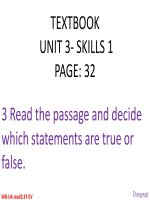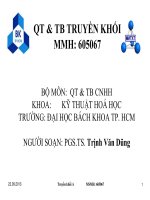Unit 08 3 sports and games lesson 3 a closer look 2 kho tài liệu học tiếng anh
Bạn đang xem bản rút gọn của tài liệu. Xem và tải ngay bản đầy đủ của tài liệu tại đây (1.04 MB, 46 trang )
August 20, 2017
By: Le Viet Phu
Game: Pelmanism
WRITE
LIVE
SPENT
GET
GOT
TOOK
WROTE
HAD
HAVE
SPEND
LIVED
TAKE
NEW LESSON
THE PAST SIMPLE
Minh went to school yesterday.
Peter didn’t do his homework last night.
Did you tell him about the picnic?
I. FORMATION:
I / He /
She / It
+
We / You
/ They
I / He/
She / It
We / You /
They
?
was
were
was not
(wasn’t)
were not
(weren’t)
Was
I / he / she / it
Were
we / you / they
at school
yesterday.
at the beach last
week.
- Yes, he was
- No, he wasn’t
hungry? - Yes, they were
- No, they weren’t
* Affirmative:
Work – worked – worked
Go
– went
– gone
Buy
– bought – bought
Ex:
They worked in the garden yesterday.
He went to school yesterday.
I bought a new pair of shoes last night.
* Affirmative:
S+
Regular VERB (-ed)
Irregular VERB (II)
+ O/C
Ex:
They worked in the garden yesterday.
He went to school yesterday.
I bought a new pair of shoes last night.
* Negative:
Did + NOT
S+
didn’t
+ Verb
(in simple form)
+ O/C
Ex:
They didn’t work in the garden yesterday.
He didn’t go to school yesterday.
I didn’t buy a new pair of shoes last night.
* Interrogative:
Verb
(Wh-) Did + S +
+ O / C ...?
(in simple form)
Ex:
Did he go to school yesterday?
Did they work in the garden yesterday?
Did you buy a new pair of shoes last night?
* Interrogative:
Ex: Did he go to school yesterday?
Answer:
- Yes, he did.
- Yes, he went to school yesterday.
- No, he didn’t.
- No, he didn’t go to school yesterday.
SUMMARY:
Affirmative:
S +
Regular VERB (-ed)
+ O/C
Irregular VERB (II)
Negative:
S+
DID + NOT
+ Verb
didn’t
(in simple form)
+ O/C
Interrogative:
(Wh-) Did + S +
Verb
+ O / C ...?
(in simple form)
WE USE SİMPLE PAST TENSE TO TALK ABOUT
1. Completed actions in the past.
My mom made some pancakes for us
yesterday.
2. A series of completed actions in the past.
Yesterday I finished my work, walked to the
beach, and found a nice place to swim.
WE USE SİMPLE PAST TENSE TO TALK ABOUT
3. Habitual or repeated actions in the past,
often goes with Adverbs of frequency
(always, usually, often, sometimes,
seldom, never).
I always went to the beach when I
lived in Nha Trang 5 years ago.
* Markers: (Dấu hiệu nhận biết thì quá khứ đơn)
- Yesterday
- Last (night / week / month / year /
Christmas / Sunday / …)
- Ago
- In + past year (in 2010)
- In the past
- Since + S + V (since I was young)
- When / while + Short actions in the past
(When I saw him, he was eating an apple)
RULES FOR ADDING –ed:
• Add –ed to most verbs
• Drop the “e” and add “ed” to verbs that end
with “mute -e” (smile = smiled).
• Change the “y” to “i” and add –ed to verbs
that end with a consonant and “y” (vowel)
(carry = carried, study = studied).
• Double the consonant and add –ed to verbs
that end with one vowel and one consonant
( drag= dragged, stop= stopped).
• Be careful with verbs like Mix, Fix Fixed.
The ways to pronounce _ed at the end
of ordinary verbs
Cách đọc
Âm cuối
Ví dụ
/d/
(các âm còn lại ngoài
2 nguyên tắc riêng
dưới đây)
answered, played,
begged, allowed
(nguyên tắc chung)
/ ɪd /
d, t
(nguyên tắc riêng 1)
(đạn tịt)
visited, needed,
mended, wanted
looked, faxed,
/t/
passed, stopped,
(nguyên tắc riêng 2) [khi xuống sông phải coi watched, washed,
chừng cô ấy (she) té (falls)]
laughed
k, x, s, p, ch, sh, f
1. Complete the sentences with did, was, or were.
1. The 2012 Olympic Games ____ held in London.
2. - Who _______ the first man on the Moon?
- Neil Armstrong.
3. - I _____ at the gym last Sunday, but I ______
not see you there.
- No, I _____ at my aunt’s house.
4. - _____ you climb Mount Fansipan when you
_____ in Sapa?
- Yes, I ____. It ____ tiring, but very interesting.
1. Complete the sentences with did, was, or were.
1. The 2012 Olympic Games was
____ held in London.
2. - Who _______ the first man on the Moon?
- Neil Armstrong.
3. - I _____ at the gym last Sunday, but I ______
not see you there.
- No, I _____ at my aunt’s house.
4. - _____ you climb Mount Fansipan when you
_____ in Sapa?
- Yes, I ____. It ____ tiring, but very interesting.
1. Complete the sentences with did, was, or were.
1. The 2012 Olympic Games was
____ held in London.
2. - Who _______
was the first man on the Moon?
- Neil Armstrong.
3. - I _____ at the gym last Sunday, but I ______
not see you there.
- No, I _____ at my aunt’s house.
4. - _____ you climb Mount Fansipan when you
_____ in Sapa?
- Yes, I ____. It ____ tiring, but very interesting.
1. Complete the sentences with did, was, or were.
1. The 2012 Olympic Games was
____ held in London.
2. - Who _______
was the first man on the Moon?
- Neil Armstrong.
3. - I _____
was at the gym last Sunday, but I ______
did
not see you there.
- No, I _____
was at my aunt’s house.
4. - _____ you climb Mount Fansipan when you
_____ in Sapa?
- Yes, I ____. It ____ tiring, but very interesting.
1. Complete the sentences with did, was, or were.
1. The 2012 Olympic Games was
____ held in London.
2. - Who _______
was the first man on the Moon?
- Neil Armstrong.
3. - I _____
was at the gym last Sunday, but I ______
did
not see you there.
- No, I _____
was at my aunt’s house.
4. - Did
_____ you climb Mount Fansipan when you
_____
were in Sapa?
- Yes, I ____.
____ tiring, but very interesting.
did It was
2. Write the correct form of the verbs to complete the
conversation.
Nick: Hi there.
Sonny: Hello, Nick. Did you have a nice weekend?
Nick: Yeah, it (1. be) ____ OK. I (2. not do) _______
much. I just (3. sit) ____ at home and (4. watch)
________ TV. On Saturday afternoon, I (5. go)
______ fishing with my dad. How about you?
Sonny: Oh, I (6. have) ______ a good weekend.
Nick: Really? What (7. do) ______ you do?
Sonny: I (8. visit) _______ the museum with my family.
Then we (9. eat) ___ at my favourite restaurant.
Nick: Did you watch football on Sunday?
Sonny: Oh, yeah. The player (10. score) ________ a
fantastic goal.
2. Write the correct form of the verbs to complete the
conversation.
Nick: Hi there.
Sonny: Hello, Nick. Did you have a nice weekend?
Nick: Yeah, it (1. be) was
____ OK. I (2. not do) _______
much. I just (3. sit) ____ at home and (4. watch)
________ TV. On Saturday afternoon, I (5. go)
______ fishing with my dad. How about you?
Sonny: Oh, I (6. have) ______ a good weekend.
Nick: Really? What (7. do) ______ you do?
Sonny: I (8. visit) _______ the museum with my family.
Then we (9. eat) ___ at my favourite restaurant.
Nick: Did you watch football on Sunday?
Sonny: Oh, yeah. The player (10. score) ________ a
fantastic goal.
2. Write the correct form of the verbs to complete the
conversation.
Nick: Hi there.
Sonny: Hello, Nick. Did you have a nice weekend?
Nick: Yeah, it (1. be) was
____ OK. I (2. not do) didn’t
_______
do
much. I just (3. sit) ____ at home and (4. watch)
________ TV. On Saturday afternoon, I (5. go)
______ fishing with my dad. How about you?
Sonny: Oh, I (6. have) ______ a good weekend.
Nick: Really? What (7. do) ______ you do?
Sonny: I (8. visit) _______ the museum with my family.
Then we (9. eat) ___ at my favourite restaurant.
Nick: Did you watch football on Sunday?
Sonny: Oh, yeah. The player (10. score) ________ a
fantastic goal.









